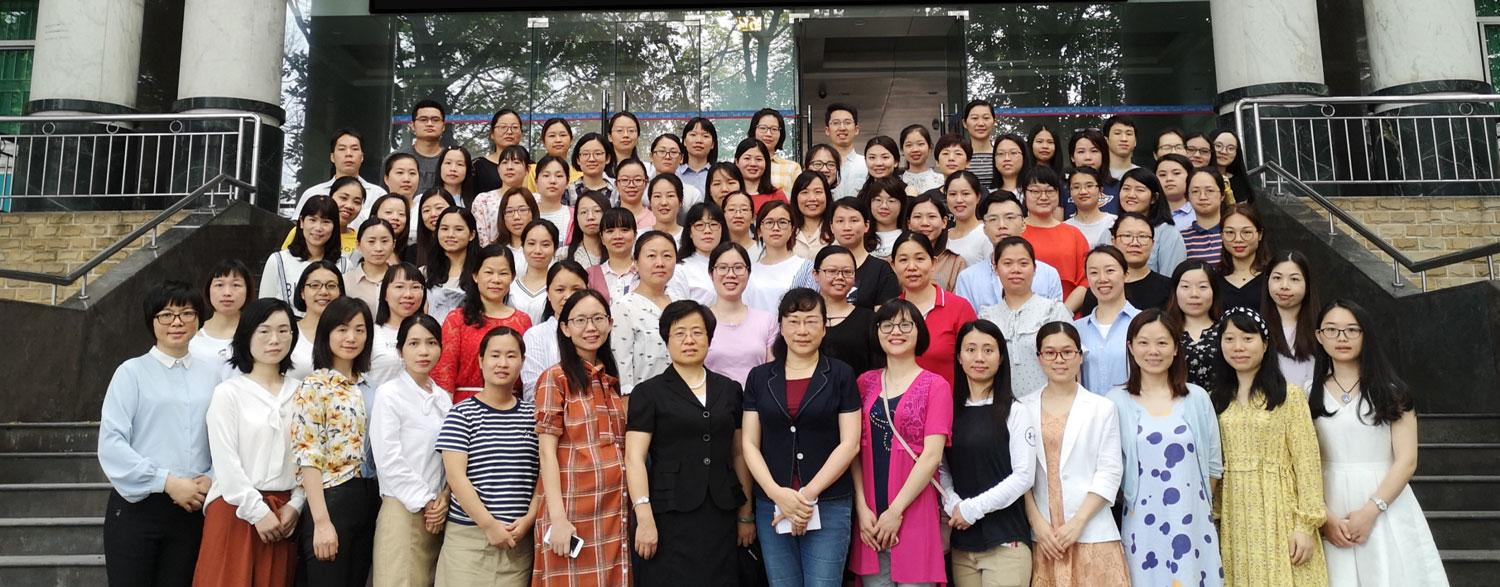Building capacity for evidence-based practice in Guangdong Province, PR China

Author: Yanni Wu, PR China Nanfang Nursing Centre for Evidence-based Practice
Nanfang Hospital is a tertiary teaching hospital in Guangdong Province, PR China, with nearly 3000 beds. In 2017, Nanfang Hospital successfully applied to become a member of the JBI Collaboration, and the PR China Nanfang Nursing Centre for Evidence-based Practice was established.
The establishment of the Nanfang Nursing Centre greatly assisted in strengthening the promotion and support for evidence-based practice (EBP) in the region. Deputy Director Yanni Wu explains: ‘After becoming a JBI Affiliated Group, we received more support from the leader of Nanfang Hospital to conduct EBP in our clinics.’
‘Since 2017, with the establishment of the Nanfang Nursing Centre for Evidence-based Practice, we have been following the JBI approach to evidence implementation’, Yanni Wu continues. ‘In contrast to other EBP models, the JBI approach includes clinical audits, which we have found to be a really practical mechanism for nurses to implement evidence into practice. For example, in 2016 we organised an EBP training program using the Iowa EBP model. We found that even though most of the nurses understood the EBP process, they did not know how to transfer evidence into clinical practice. Then, in 2017, when we first taught the JBI approach to evidence-based healthcare and required nurses to conduct EBP projects following the JBI approach, we found that, finally, the majority of projects were successfully implemented, with positive outcomes. The JBI approach gives nurses more specific, practical guidance.’

With the initial success of establishing the JBI approach to evidence-based healthcare (EBHC) within the hospital, the Nanfang Nursing Centre for Evidence-based Practice commenced promoting and disseminating the JBI approach to hospitals in Guangdong Province more broadly. In 2018, the Centre implemented the JBI Clinical Partner Engagement Activity, which included initiatives such as delivering a series of EBP-focused workshops to health professionals throughout Guangdong Province.
Yanni Wu outlines the success of the first workshop: ‘The first workshop included an introduction to EBP and the JBI model. The workshop was free, and we engaged 200 nurses from Nanfang Hospital. In order to engage a wide network of staff outside the hospital, we released a notice to all the hospitals in Guangdong Province. Each hospital was able to send two nurse managers to join the workshop, because we think nursing managers are a key stakeholder to help us promote EBP, JBI tools and other resources in hospitals. In the end, 132 nursing managers (the head nurse or the director of nursing) from 66 other hospitals in Guangdong Province participated in the workshop.’
The success of the first workshop quickly led to a second, focusing on qualitative research and JBI critical appraisal tools for appraising qualitative research, with 218 nurses from Nanfang Hospital and 132 nursing managers from 66 other hospitals participating.

In total, eight workshops were conducted over six months for each cohort, and each participant was required to complete an EBP project in their clinic using the JBI EBP implementation model. These workshops and the subsequent EBP projects have had a significant impact on healthcare practices and outcomes across more than 60 hospitals.
Within the JBI Nanfang Nursing Centre for Evidence-based Practice, capacity building began providing nurses with an opportunity to attend the JBI Evidence-based Implementation Training Program (formerly the Clinical Fellowship Program). The Evidence-based Implementation Training Program is a six-month, evidence-based implementation training program that provides foundational knowledge on change management, leadership, implementation and evaluation. It builds the capacity of health professionals to conduct unbiased, reliable clinical audits, and design and implement strategies to identify and overcome barriers to change, actively lead change, implement best practice and evaluate outcomes. As part of the program, participants conduct an EBP project with the support of a JBI facilitator. These projects have included the following endeavours.
Assessment and management of pain when changing dressings for patients with diabetic foot ulcers (DFU)
A project focusing on pain when changing dressings for patients with diabetic foot ulcers was undertaken in an endocrinology department and resulted in significantly improved compliance with best practice to relieving pain in DFU patients when they accept wound care. A baseline audit indicated that the rate of pain assessment before, during and after dressing change was low (0% to 13%), with strategies used to alleviate patients’ pain proving insufficient because nurses were focusing on wound healing rather than pain. Nurse education (workshops, presentations and pamphlets on prevalence and management of pain) was crucial in changing nurses’ attitudes towards DFU pain, resulting in 80% to 100% of nurses assessing and administering interventions for managing pain when they performed wound care.
Assessment and management of coughs in patients with lung cancer
Another implementation project focused on assessing and managing coughing in lung cancer patients, which achieved improvements in compliance to best practices, including relieving the physical pain and psychological challenges facing patients, which improved their quality of life. The project achieved ≥ 93% the compliance rates for all seven audit criteria. Specific strategies included ensuring that all patients received a comprehensive assessment of any co-existing causes linked to coughing and that they received treatment for any reversible causes of their cough. Moreover, all patients received an optimised symptomatic therapy with a stepped approach according to evidence-based guidelines.
Non-pharmacological interventions for deep vein thrombosis (DVT) prophylaxis in respiratory intensive care units (RICU)
This evidence implementation project promoted and supported the transfer of evidence to assist clinical nursing practice, which resulted in the rate of assessing for risk of DVT in patients in RICU improving from 0% to 100%. The incidence of DVT in patients in RICU was significantly reduced; indeed, no new incidence of DVT was found in the follow-up clinical audit.
‘Conducting EBP projects has enhanced career achievements for clinical nurses who, by embracing and leading practice change, have contributed to better care for their patients. At an EBP project report meeting last year, I was moved by the words of a nurse who said, “My goal when implementing evidence-based practice is not to publish a paper, but to make my patients feel better”’, says Yanni Wu.
After successfully completing numerous activities within the JBI Activity Matrix, the Nanfang Nursing Centre for Evidence-based Practice progressed to JBI Centre of Excellence status in 2019.
Collaboration, education, capacity building and stakeholder engagement, particularly with leaders, have been the keys to the success for Nanfang Hospital and its JBI Centre of Excellence. Currently, Nanfang Hospital offers strong support to the JBI Centre of Excellence in promoting EBP in clinics to improve the quality of nursing practice. Various strategies are being adopted to continue to contribute efforts in transferring evidence into practice in nursing clinics not only in Nanfang Hospital, but throughout Guangdong Province.
Further resources
Assessment and management of pain during dressing change in patients with diabetic foot ulcers
Assessment and management of cough in patients with lung cancer